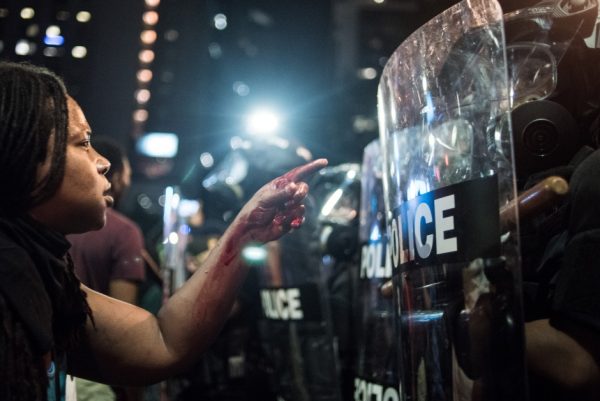By now, you probably know about Keith Lamont Scott. You’ve probably seen images of his lifeless body on the ground. You’ve probably heard the devastated voices of his grieving family members. By now, you probably know that Keith Lamont Scott was killed by a police officer last week in Charlotte, North Carolina.
However, you are probably not familiar with the name, Brentley Vinson. You are perhaps unaware that, like most in his position, he is probably suffering from post-traumatic disorder. You are probably unaware that Brentley Vinson is a police officer—the officer who killed Keith Lamont Scott. You are probably unaware that Brentley Vinson is also a Black man. You are probably unaware that Brentley Vinson is a faithful member of Central Church of God in Charlotte, North Carolina. You see, Brentley Vinson is a believer.
Last Tuesday, Brentley Vinson and three other police officers were on the search for an unidentified suspect at an apartment complex in Charlotte, North Carolina. However, an encounter between the police officers and Keith Lamont Scott at the complex culminated in Scott’s death.
Instantaneously, Scott’s grieving family, local groups, and Black Lives Matter, insisted that White police officers murdered Keith Lamont Scott in cold blood while he was reading a book in his car.
Black Lives Matter and other social justice groups are often tagged as social justice warriors. And given their vigilance, rage, and sharp, penetrating, sword-like words, the term social justice warrior is appropriate. However, since social justice is often carried out on social media— and not the courtroom—through trendy words of 140 characters or less, perhaps, Black Lives Matter are less like warriors, and more like: judge, jury, and prosecutor.
Within hours after Keith Lamont Scott’s death, Black Lives Matter leaders and supporters—many of whom are believers—virtually charged, prosecuted, and convicted Brentley Vinson, whom they presumed was White, of murdering Keith Lamont Scott. Apparently, Keith Lamont Scott’s life matters to Black Lives Matter; Brentley Vinson’s life does not.
Days after the shooting, there is now evidence suggesting that Brentley Vinson may have been justified in his actions. Video footage reveal that Keith Lamont Scott exited his car upon seeing the police officers, he was then ordered to drop his gun—which is reportedly a stolen gun—several times, but apparently refused to do so, before Brentley Vinson shot and killed him.
Nevertheless, I confess that I do not entirely know or understand what happened between Keith Lamont Scott and the police officers. I am not particularly interested in defending either Keith Lamont Scott or Brentley Vinson. I am neither a judge, jury, nor a prosecutor.
I am simply suggesting that for the sake of Brentley Vinson, for the sake of the White photographer who was nearly burned alive by rioters, for the sake of several injured civilians and police officers during the riots, for the sake of murdered Justin Carr—whose murder Black Lives Matter rashly and falsely blamed on police officers—during the Charlotte riots: do not conform to Black Lives Matter’s rash and destructive rhetoric.
Considering that the Bible says, “He who justifies the wicked and he who condemns the righteous are both alike an abomination to the LORD (Proverbs 17:15)”, shouldn’t we be, “quick to hear, slow to speak, slow to anger (James 1:19) on this issue?
In other words, we should be: quick to wisdom, quick to humility, quick to patience, quick to love, and slow to slander.
Ultimately, we should be like our God, whom the Bible describes as, “merciful and gracious, slow to anger and abounding in steadfast love (Psalm 103:8).”
If we were outraged by the mere possibility that a racist White police officer may have have murdered Keith Lamont Scott, but remained unmoved and uncaring about the videos of enraged Black rioters in Charlotte beating up on homeless and defenseless white men, for example, what does that say about us?
If our hatred for racism and police brutality causes us to slander others, including even our own brothers like Brentley Vinson, then perhaps, our hatred for racism and police brutality is not rooted in a Christ-centered hatred for sin, but instead, it may be rooted in a self-centered, bitter, and sinful heart. And if that’s the case, as we continue to examine police officer’s characters and conduct, we should examine our own characters too. Lest we become more like Black Lives Matter, and less like Christ.

